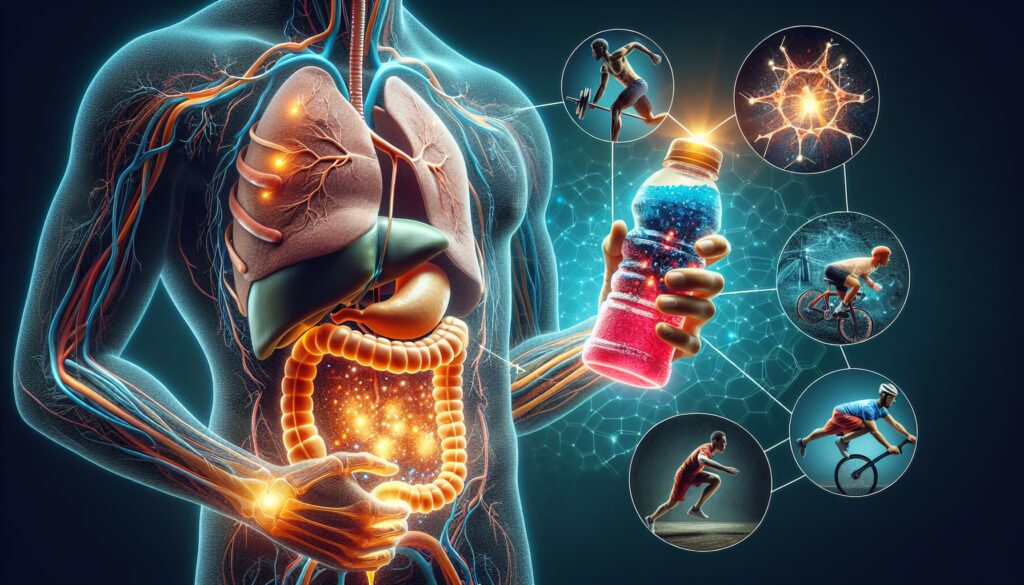
Understanding how sports drinks affect blood sugar levels is crucial for individuals with diabetes who need to manage their glucose levels carefully. Balancing hydration and blood sugar is a delicate process, which is why it's important to know the impact of different beverages.
While sports drinks are designed to replenish nutrients lost during exercise, not all are suitable for diabetes management. It's essential to choose the right type of sports drink to avoid adverse effects on blood glucose levels.
🔍 Seeking a breakthrough in Type 2 Diabetes management?
Discover our expert insights and innovative approaches on ‘How to Cure Diabetes’.
Click to transform your health journey today!
What you\'ll find in this article?
- How Do Sports Drinks Affect Blood Glucose Levels?
- Best Sports Drinks for People with Diabetes
- Worst Sports Drinks for Managing Blood Sugar
- Why Does Exercise Sometimes Raise Blood Glucose?
- Tips to Prevent Blood Glucose Spikes During Workouts
- Understanding the Role of Electrolytes in Hydration
- The Impact of Energy Drinks on Blood Glucose Management
- Exploring Questions on Sports Drinks and Blood Sugar Levels
How Do Sports Drinks Affect Blood Glucose Levels?
Sports drinks are formulated to provide quick energy and replace lost electrolytes during intense physical activity. For people with diabetes, this can mean a rapid rise in blood glucose levels due to the high sugar content typically found in these beverages.
The main components of sports drinks include carbohydrates, electrolytes, and sometimes, protein. Most of the carbohydrates are sugars, which can lead to quick spikes in blood glucose. This is especially problematic for those whose insulin response is impaired.
The timing of consumption also plays a role in how your body processes the sugars. Drinking them during or after intense exercise may have a different impact than drinking them at rest.
Moreover, studies have shown that the body's response to these drinks can vary depending on the individual's level of fitness and existing metabolic conditions. Monitoring blood glucose levels before and after consumption is advisable for those with diabetes.
It's a balancing act between maintaining adequate hydration and managing glucose intake, and it's important for individuals with diabetes to consult with their healthcare provider about the best approach.
Explore our specialized services in diabetes care 🌟.
From personalized diet plans to effective exercise routines, we have what you need to take control of Type 2 Diabetes.
Visit our services page now!











Best Sports Drinks for People with Diabetes
When choosing a sports drink, those with diabetes should look for options that are low in sugar and calories. Here are some of the best hydration drinks for diabetics:
- Electrolyte-infused water with minimal or no added sugars.
- Low-calorie drinks that use sugar substitutes for sweetness.
- Drinks that contain glucose polymers, which may have a more gradual impact on blood sugar levels.
It is also beneficial to consider sports drinks that have added protein, as protein can help modulate the absorption rate of carbohydrates and thus glucose.
Reading labels is key to understanding what you're consuming. Checking for total carbohydrates, types of sweeteners used, and any additional nutrients can help make an informed choice.
Remember, water should be the primary source of hydration, with sports drinks used judiciously during prolonged or particularly intense exercise sessions.
Worst Sports Drinks for Managing Blood Sugar
Some sports drinks can be the worst options for blood sugar management due to their high sugar content. Here are the types to avoid:
- Drinks with high levels of fructose, sucrose, or other simple sugars.
- Beverages with added caffeine, which may affect blood sugar levels indirectly by prompting an adrenaline release.
- Energy drinks that may contain not only sugar but also other stimulants.
Excessive consumption of these types of drinks can lead to hyperglycemia, and over time, may contribute to insulin resistance. It's best to steer clear of these and opt for more diabetes-friendly hydration options.
The allure of sports drinks, with their promise of enhanced performance and recovery, can be strong. However, managing blood glucose with sports drinks requires careful selection and moderation.
Why Does Exercise Sometimes Raise Blood Glucose?
Exercise is generally beneficial for blood sugar management, but it can sometimes lead to unexpected increases in blood glucose. This phenomenon is often due to the body's stress response, which releases glucose for extra energy.
During intense exercise, the body may produce stress hormones like adrenaline and cortisol. These hormones prompt the liver to release more glucose into the bloodstream, which can lead to a temporary spike in blood sugar levels.
Additionally, if insulin levels are not adjusted properly before exercise, glucose released from the liver is not effectively taken up by the muscles, leading to higher blood glucose levels.
Therefore, monitoring blood sugar before, during, and after exercise is important to understand and manage these patterns. Adjusting insulin doses and carbohydrate intake may be necessary to maintain optimal glucose levels during physical activity.
Understanding sports drinks impact on glucose (blood sugar) levels during exercise is critical for individuals with diabetes.
Tips to Prevent Blood Glucose Spikes During Workouts
Here are some practical tips to help individuals with diabetes prevent unwanted blood glucose spikes during their workouts:
- Monitor blood sugar levels closely before, during, and after exercise.
- Plan your insulin doses and carbohydrate intake around your workout schedule.
- Choose low-sugar or sugar-free hydration options to minimize glucose intake.
- Stay hydrated with water as much as possible and use sports drinks sparingly.
- Know your body's responses to different types of physical activity and adjust your diabetes management plan accordingly.
Remember that each individual's response to exercise and sports drinks will vary. Tailoring your exercise and hydration strategy to your body's needs is the best way to maintain stable blood glucose levels during workouts.
Understanding the Role of Electrolytes in Hydration
Electrolytes such as sodium, potassium, and magnesium play a key role in hydration, especially during physical activity. These minerals help regulate fluid balance, muscle contractions, and nerve function.
Sports drinks typically contain a blend of electrolytes to replace what is lost through sweat. For individuals with diabetes, it's essential to choose drinks that provide the necessary electrolytes without excess sugar.
While electrolyte replacement is important, it should not come at the expense of blood glucose control. Selecting the right sports drink or alternatively, taking electrolyte tablets with water can be a safer option for maintaining both proper hydration and glucose levels.
Balance is key here—too little electrolyte replenishment can lead to conditions like hyponatremia, while too much sugar can disrupt blood sugar balance.
It's also worth noting that regular meals and snacks typically provide a sufficient amount of electrolytes for most people, so supplementing with sports drinks may not always be necessary.
The Impact of Energy Drinks on Blood Glucose Management
Energy drinks are often confused with sports drinks, but they are quite different and can have a significant impact on blood glucose management. These drinks usually contain high levels of caffeine and sugar, which can lead to quick and drastic spikes in blood sugar levels.
Most energy drinks are not recommended for individuals with diabetes due to their high sugar content and the potential for causing hyperglycemia. Additionally, the caffeine in these drinks can cause an increase in insulin resistance.
For those looking to improve their endurance performance or energy levels during exercise, it's best to stick with diabetes-friendly sports drinks or simple water and to avoid energy drinks altogether.
Understanding the composition of these beverages and how they affect your body is crucial when managing diabetes.
With proper planning and awareness, it is possible to maintain peak performance without compromising blood glucose levels.
Exploring Questions on Sports Drinks and Blood Sugar Levels
Do Electrolytes Increase Blood Sugar?
Electrolytes themselves do not have a direct impact on blood sugar levels. However, some electrolyte replacement products may contain sugars or other carbohydrates that can affect glucose levels.
It's essential to read product labels carefully and opt for electrolyte replacements that do not contain added sugars or have minimal impact on blood sugar.
Is Gatorade Bad for High Blood Sugar?
Gatorade and similar sports drinks can be problematic for people with high blood sugar due to their sugar content. Opting for low-sugar or sugar-free versions is advisable for better blood sugar management.
However, during prolonged and intensive exercise, a small amount of Gatorade may be appropriate to prevent hypoglycemia, but this should be balanced with individual glucose monitoring and medical advice.
Can Energy Drinks Spike Blood Sugar?
Yes, energy drinks can spike blood sugar significantly due to their high sugar and caffeine content. People with diabetes should generally avoid these drinks or choose sugar-free alternatives.
It's important to differentiate between energy drinks and sports drinks, as they have different compositions and effects on blood glucose levels.
What Are the Three Worst Drinks for Blood Sugar?
The three worst types of drinks for people concerned about blood sugar are:
- Sugary sodas and fruit juices, which can lead to rapid glucose spikes.
- Energy drinks high in sugar and caffeine, which can disrupt insulin sensitivity.
- Alcoholic beverages, especially those with sugary mixers, as alcohol can affect the liver's ability to regulate blood sugar.
Making informed choices about what to drink is crucial for maintaining stable blood glucose levels and overall health.
✨ Other articles you might be interested in:



